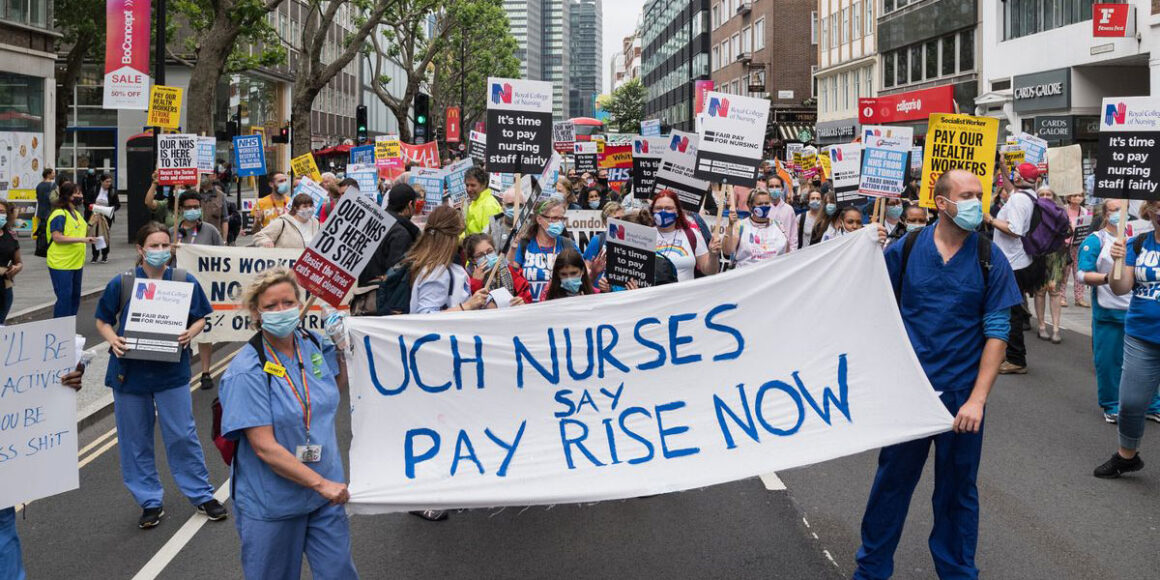

AS WE go to press NHS managers and Health Minster Steve Barclay are dragging the largest NHS union, the Royal College of Nursing, before the High Court in a bid by to block nurses’ strike action due to start on the May Day weekend.
They claimed that the strike mandate would be invalid from midnight on 1 May and action thereafter was unlawful, opening the union to a massive theft of its funds drawn from members’ subs. RCN leader Pat Cullen called such anti-union laws ‘draconian’ but made it clear that the RCN would never back illegal action.
The Tory government’s actions demonstrate how legal shackles restrict and nullify every aspect of effective trade union action, worse in Britain than almost every other major European country. But it also shows the weakness of trade union leaderships when faced with such tyranny.
Neither the individual unions nor the TUC has done anything serious to mobilise direct action to defy and smash these laws, such as was done in the early 1970s. The revival of rank and file activity in a number of unions lays the foundation for building up defiance, not compliance with these anti-democratic laws and the courts, weighted heavily in the bosses’ favour.
NHS Workers Say NO
For the RCN leaders to restrict themselves to fighting in the bosses’ courts is hardly a surprise. The union’s executive only called this strike when its members, mobilised by the rank and file campaign NHS Workers Say NO, rejected their recommendation to accept the government’s insulting below inflation pay offer for 2022–23 and 2023–24.
In the ballot 54% of those who voted rejected the deal, against 46% voting to accept. Coming on top of general secretary Pat Cullen’s unilateral halving of the claim decided on by the union conference, this shows that no confidence can be put in such leaders.
Rank and file delegates have an opportunity to express this at the RCN conference, which meets on 14–18 May. But more than this, they need to take over the reins of running the dispute, controlling the negotiators and reasserting their original claim of inflation plus 5%.
Most importantly they should send out a message that future strikes, for which a fresh ballot mandate is needed, need to be far more punishing if nurses are to win their claim before ‘Christmas’, as Cullen ominously warned would be necessary with the current strategy.
Nurses should also demand maximum unity with all other unions fighting for real pay rises, not just the doctors, but other NHS staff, teachers, lecturers, civil servants, etc. The idea that keeping their distance from other sectors would lead to a better deal has been blown out of the water.
Unite health strikes
But nurses don’t have to wait until then to show their solidarity with other NHS workers. Thanks to the hard work of activists, not least nurses, several Unite health branches are launching strike action, starting at Guy’s and St Thomas’ hospitals in London and the Yorkshire Ambulance Service on 1–2 May.
If the courts rule against the RCN on 27 April and Cullen and the officials call off the strikes, those nurses who are disgusted with their leadership’s backsliding, prevarication and incompetence, should defy the judges and support the Unite NHS strikes wherever possible by not crossing picket lines and if need be by joining Unite.
The very future of the NHS depends on raising the wages of nurses, junior doctors and ancillary staff, not only to cover the last two years’ rampant double digit inflation and attract staff to fill the 133,000 vacancies, but also to recover the £23.5 billion robbed from the NHS by Tory austerity over the past decade.